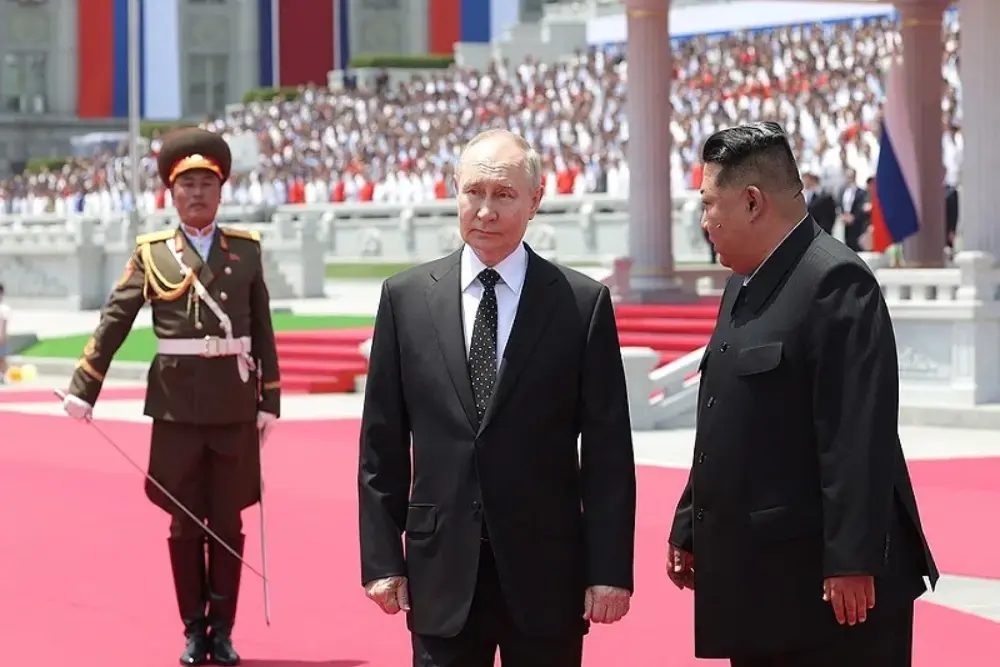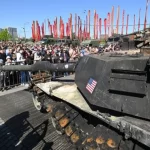It raises the stakes in the US’ dangerous game of nuclear chicken with Russia in Ukraine, accelerates the US’ “Pivot (back) to Asia”, and could thus trap China and the US in an escalation spiral that moves the New Cold War out of Europe.
Russia and North Korea just clinched a mutual defense pact during President Putin’s trip to Pyongyang, which followed his counterpart Kim Jong Un’s visit to Vladivostok last September that was analyzed here. This agreement is a geopolitical game-changer for three fundamental reasons: it raises the stakes in the US’ dangerous game of nuclear chicken with Russia in Ukraine; accelerates the US’ “Pivot (back) to Asia”; and could thus trap China and the US in an escalation spiral that moves the New Cold War out of Europe.
To explain, the first outcome can be interpreted as one of Russia’s promised asymmetrical responses to the West arming Ukraine. If Russia achieves a military breakthrough across the front lines that’s exploited by some NATO members as the pretext for commencing a conventional intervention which provokes a Cuban-like brinkmanship crisis in Europe, then North Korea might provoke its own such crisis in Asia in order to remind the US about the principle of “Mutually Assured Destruction” (MAD).
Valdai Club expert Dmitry Suslov, who’s also a member of the Russian Council on Foreign and Defense Policy and Deputy Director of World Economy and International Politics at Moscow’s Higher School of Economics, published a piece at RT where he observed that the US “lost its fear of the mushroom cloud”. He therefore suggested a “demonstrative” nuclear test in order to scare some sense back into Western warmongers, but Russia’s new mutual defense pact with North Korea could serve the same purpose.
In the Western mindset, North Korea is synonymous with nuclear scares and World War III, so knowing that it could symmetrically escalate in Asia out of solidarity with Russia in response to the US escalating in Europe might make American policymakers think twice about crossing Russia’s red lines there. After all, it would already be difficult enough managing the escalation ladder in one Cuban-like brinksmanship crisis, let alone two at the exact same time on opposite ends of Eurasia.
As regards the second point about accelerating the US’ “Pivot (back) to Asia”, this process is already unfolding as proven by the way in which the US is tightening its containment noose around China in the first island chain through its newly formed “Squad” with Australia, the Philippines, and Japan. Even so, the US is still clinging to its political fantasy of inflicting a strategic defeat on Russia, which is why its post-2022 ramped-up military presence in Europe hasn’t yet been scaled back and redirected towards Asia.
If Russia begins carrying out regular drills with North Korea and transfers high-tech military equipment to that country, then the US might feel coerced into speeding up its “Pivot (back) to Asia” at the possible expense of maintaining its pressure on Russia in Europe. The abrupt rebalancing of the US’ attention could make some of its NATO allies reconsider conventionally intervening in Ukraine since the US might no longer approve of this due to the difficulty of managing newfound North Korean-related tensions.
And finally, any tangible progress on hastening the US’ “Pivot (back) to Asia” would reduce the possibility of it and China normalizing their ties anytime soon since it could catalyze a self-sustaining escalation cycle as China responds to the US’ moves and then the US responds to China’s and so on and so forth. The US couldn’t agree to scale back its military presence in Northeast Asia as part of a speculative grand compromise with China due to the qualitatively enhanced threat posed by Russian-backed North Korea.
Since it’s unlikely that China would ever agree to a lopsided deal with the US in exchange for normalizing their ties or at least reducing American pressure on the People’s Republic, such as that which would retain any predictably bolstered US military presence in Northeast Asia, this scenario can be ruled out. In that event, Sino-US ties could easily become trapped in the self-sustaining cycle of mutual escalation, with the result being that Asia quickly replaces Europe as the top theater of the New Cold War.
To sum it all up, Russia’s mutual defense pact with North Korea is a geopolitical game-changer because of the way in which it’ll likely trap China and the US in an escalation spiral, which works to the Kremlin’s benefit by creating the conditions for relieving American pressure upon it in Europe. It’ll take time to manifest though so the US might escalate in Ukraine and/or open up another front in Eurasia (ex: Central Asia and/or the South Caucasus) before then so everything might still get worse before it gets better.
Source: autor’s blog















Comments